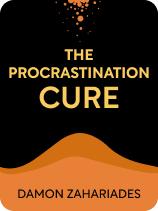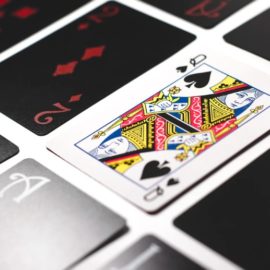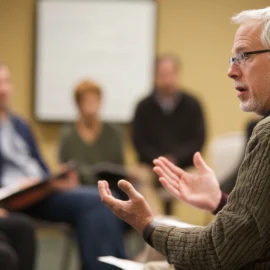

This article is an excerpt from the Shortform book guide to "The Procrastination Cure" by Damon Zahariades. Shortform has the world's best summaries and analyses of books you should be reading.
Like this article? Sign up for a free trial here.
What causes procrastination? Why is it so hard to take the first step to get to work?
In The Procrastination Cure, Damon Zahariades offers several reasons why people procrastinate. We’ve compiled these reasons into three categories: your brain prefers immediate rewards, fear and negative self-esteem get in the way, and you’re scared to take the first step.
Let’s look at these causes of procrastination to get a better idea.
1. You’re Wired to Seek Immediate Rewards
Zahariades identifies several reasons for what causes procrastination. One is that your brain instinctively prefers immediate rewards to delayed gratification. By the same token, immediate negative consequences are a compelling deterrent, but delayed consequences aren’t. Put another way, procrastination is a conflict between the opposing interests of Present You and Future You. This explains why you may procrastinate when a task doesn’t energize you or when it seems like nothing bad will happen if you don’t do it. The more difficult and complex a task, the greater the reward your brain needs to perceive in pursuing it.
(Shortform note: From a neuroscience perspective, Present You might represent the amygdala, the region of the brain that controls your survival instincts, guiding you away from threats and towards rewards; while Future You stands in for the prefrontal cortex, where you do your higher-level reasoning and planning. The amygdala evolved much earlier than the prefrontal cortex, and even though the amygdala reacts faster, it’s not always accurate. When the amygdala gets triggered by the tasks on your to-do list, procrastination is part of your fight-or-flight response.)
2. Your Thoughts and Feelings Enforce Your Procrastination
We’ve explored some ways procrastination can result from the human brain’s search for rewards, but Zahariades considers other possible sources of the problem as well. He presents several models of how a task that stirs up strong emotions or triggers negative thoughts can lead you to procrastinate.
Zahariades suggests that the emotional culprit behind most procrastination is fear. This fear can take many forms, he explains:
- Fear of failure: When a task involves something you don’t have much experience doing, you don’t believe you’re good at, or that reminds you of a past experience that went badly
- Fear of success: When you’re not sure you can live up to high expectations, you feel you haven’t earned your success, or you’re nervous about what might come after success (like a bigger workload or more intense scrutiny)
- Perfectionism, or fear of imperfection: When the risk of a less-than-perfect outcome is so unbearable that you avoid the task altogether
Zahariades also says negative self-talk—when your internal voice is critical or full of worry—can trigger procrastination by undermining your self-confidence, making you reluctant to act. You can combat negative self-talk by disputing it and replacing it with a more realistic perspective.
3. You Can’t Take the First Step
The next group of issues that might be driving your procrastination relates specifically to initiating work on a task or project. Zahariades points out a few reasons why starting is the hardest part for many people. For one thing, if it’s a major undertaking, you may feel overwhelmed by the task at hand—and feeling overwhelmed for any reason makes it difficult to take action. You may also delay starting because you’re uncertain about what to do first or because you’re inclined to keep researching and considering options to avoid making a choice. Indecisiveness, Zahariades cautions, can be a symptom of some of the other causes of procrastination already mentioned, like aversion to risk, fear of failure, or perfectionism.
(Shortform note: In Predictably Irrational, behavioral economist Dan Ariely offers another explanation for decision-making struggles: He says you have two selves. When you’re in a “cool state,” you make calm, rational decisions, and when you’re in an “aroused state,” you make irrational, impulsive decisions. He introduces procrastination as the abandonment of rational plans in order to indulge in whatever will appease your aroused-state emotions.)
If taking the first step is where you’re stuck, consider the following advice:
- Make an exception to the “do the hardest thing first” rule, and instead start with the easiest thing and build momentum.
- If unrelated personal or professional issues are causing the overwhelm, tackle those situations directly.
- If you’re not sure how to approach the task, consider the possible outcomes of each option to show yourself none of them ends in disaster. The cost of staying stuck in deliberation is usually greater than the cost of making an imperfect choice.
- Commit to working on a task for just ten minutes. Once you get started, momentum will make it easier to continue.
- Break down bigger tasks into smaller steps, and treat each step as its own to-do item. This helps you avoid feeling overwhelmed and lets you see your progress as you go.
(Shortform note: Task initiation, or the ability to start doing things, is one of several important cognitive skills that make up executive functioning. People who have trouble with executive functioning—including those with ADHD and executive function disorder (EFD)—are often chronic procrastinators. Other elements of executive functioning include planning, prioritizing, and estimating how long things will take, all of which figure into Zahariades’s recommendations for overcoming procrastination. More research is needed to determine whether all procrastination is caused by executive functioning differences in the brain.)

———End of Preview———
Like what you just read? Read the rest of the world's best book summary and analysis of Damon Zahariades's "The Procrastination Cure" at Shortform.
Here's what you'll find in our full The Procrastination Cure summary:
- Advice from a former chronic procrastinator on how to stop procrastinating
- How to get to the bottom of what drives you to procrastinate
- How to use lists and schedules to manage your time and tasks



![Charlie Munger’s 8 Secrets to Living a Good Life 8 Secrets to Living a Good Life [Charlie Munger]](https://www.shortform.com/blog/wp-content/uploads/2021/06/good-life-morning-coffee-270x270.jpg)


